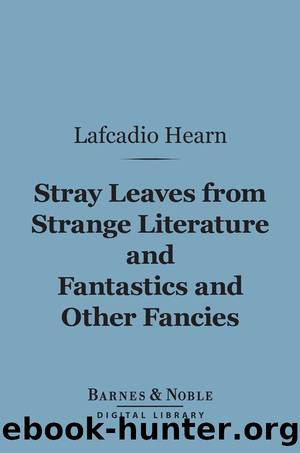Stray Leaves from Strange Literature and Fantastics and Other Fancies by Lafcadio Hearn

Author:Lafcadio Hearn [Hearn, Lafcadio]
Language: eng
Format: epub
ISBN: 9781411451391
Publisher: Barnes and Noble, Inc.
Published: 2017-02-15T00:00:00+00:00
Would start and tremble under her feetâ
And blossom in purple and red."
It was this "Fantastic," published first in the Item on October 21, 1880, and later re-written in more ornate style and published in the Times-Democrat on April 6, 1884, under the title of "L'Amour après la Mort," which is the only one of the weird little sketches that has appeared in book form, outside of those which he himself republished in Stray Leaves from Strange Literature, and Some Chinese Ghosts.
For it was this one which he sent to a friend with the deprecatory criticism that it "belonged to the Period of Gush" and the request "to burn or tear it up after reading." He had merely enclosed it to show how and when he had first used the phrase "lentor inexpressible" to which his friend had objected.
"Fortunately his correspondentâas did most of those to whom he wroteâtreasured everything in his handwriting," says his biographer, Mrs. Elizabeth Bisland Wetmore, "and the fragment which boreâmy impression isâthe title of 'A Dead Love' (the clipping lacks the caption) remains to give an example of some of the work that bears the flaws of his 'prentice hand, before he used his tools with the assured skill of a master." And she quotes the strange, fanciful little sketch in full, with the comment: "To his own, and perhaps other middle-aged taste, 'A Dead Love' may seem negligible, but to those still young enough, as he himself then was, to credit passion with a potency not only to survive 'the gradual furnace of the world,' but even to blossom in the dust of graves, this stigmatization as 'Gush' will seem as unfeeling as always does to the young the dry and sapless wisdom of granddams. To them any version of the Orphic myth is tinglingly credible. Yearningly desirous that the brief flower of life may never fade, such a cry finds an echo in the very roots of their inexperienced hearts. The smouldering ardor of its style, which a chastened judgment rejected, was perhaps less faulty than its author believed it to be in later years."
"It was to my juvenile admiration for this particular bit of work," she goes on, "that I owed the privilege of meeting Lafcadio Hearn in the winter of 1882, and of laying the foundation of a close friendship which lasted without a break until the day of his death."
His linking of love with death in this and the other "Fantastics" was in full accord with the sombre atmosphere of the trebly stricken city to which he had comeâa city with a glorious and a joyous past, but just then ruined by three horrors:ârecent war, misrule under the carpet-baggers, and oft-recurring pestilence. He had come expecting much from a semi-tropical environment. He found sorrow and trouble and a wasted land; and his mood was soon in unison with the disastrous elements around him. His letter to his friend Watkin when he first came to this smitten Paradise shows how strong the impression was: "When I saw it firstâsunrise over Louisianaâthe tears sprang to my eyes.
Download
This site does not store any files on its server. We only index and link to content provided by other sites. Please contact the content providers to delete copyright contents if any and email us, we'll remove relevant links or contents immediately.
Beautiful Disaster by McGuire Jamie(25330)
Trainspotting by Irvine Welsh(21663)
Call Me by Your Name by André Aciman(20515)
The Secret History by Donna Tartt(19086)
All the Missing Girls by Megan Miranda(16023)
Cat's cradle by Kurt Vonnegut(15352)
Pimp by Iceberg Slim(14506)
Norse Mythology by Gaiman Neil(13363)
The Tidewater Tales by John Barth(12659)
4 3 2 1: A Novel by Paul Auster(12391)
Scorched Eggs by Childs Laura(11351)
The Break by Marian Keyes(9368)
The remains of the day by Kazuo Ishiguro(8999)
Adultolescence by Gabbie Hanna(8927)
Never let me go by Kazuo Ishiguro(8900)
Where the Crawdads Sing by Delia Owens(8624)
All the Light We Cannot See: A Novel by Anthony Doerr(8496)
A Man Called Ove: A Novel by Fredrik Backman(8437)
Circe by Madeline Miller(8140)
